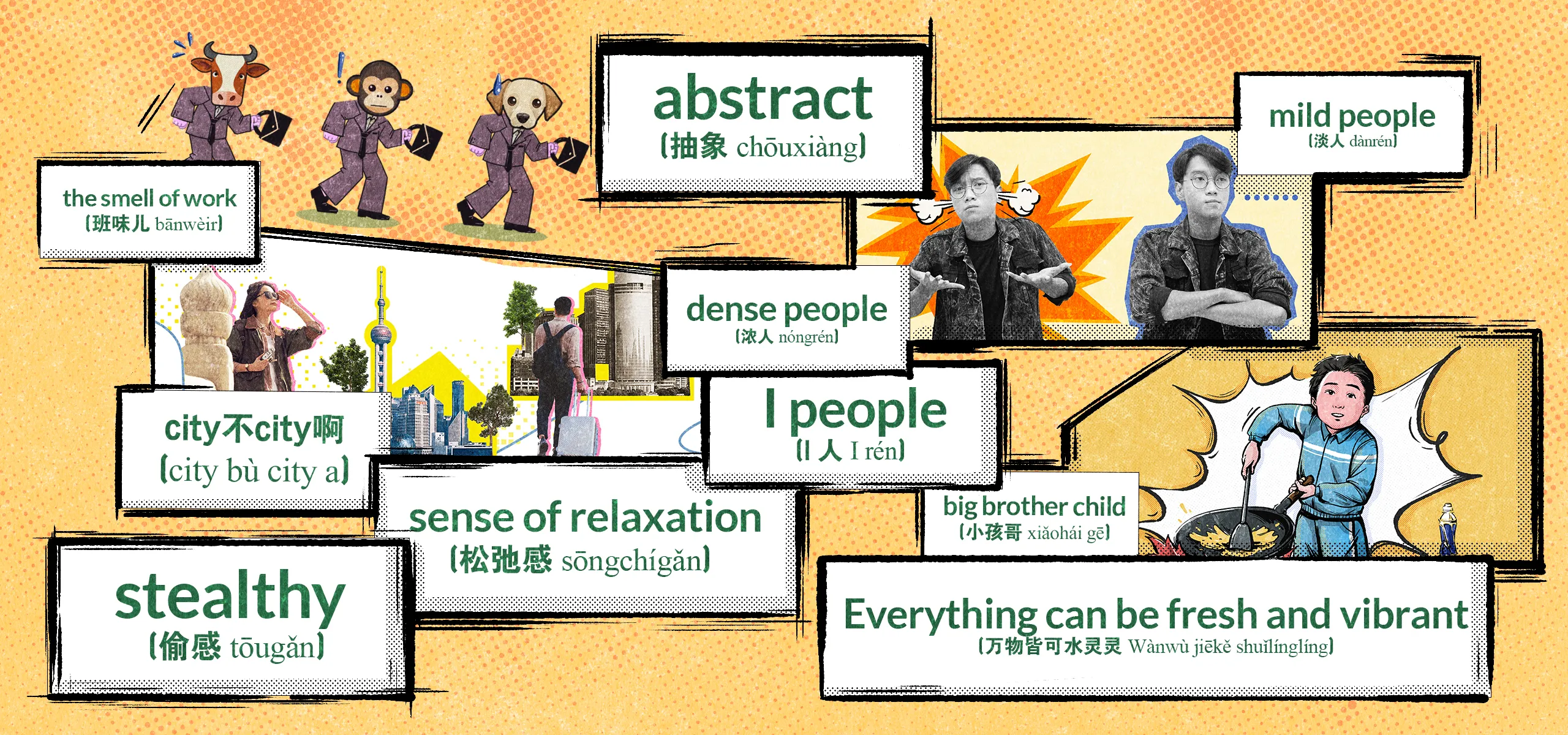Consider yourself a slang master? Take TWOC’s annual buzzword test and find out if you really are in the know
Dear readers, congratulations on completing another circumnavigation of the world wide web! We hope it was filled with humor, delight, and edification. Have you been paying attention along the way, though? Are you a true citizen of the Chinese internet, or a mere passerby? We’ve devised a quiz to test just this.
If you’ve kept up with TWOC’s slang column, this is a test you shouldn’t fail. Good luck!
Choose the correct answer based on the latest trends in 2024:
1. The words “dense (浓 nóng)” and “mild/thin/light (淡 dàn)” are often used to describe ___.
A. the seasoning of a local cuisine dish
B. the color of paintings
C. the pattern on sweaters
D. types of personalities
2. What’s the new term commonly used to describe a person who prefers to maintain a cautious and reserved mindset, and avoid excessive attention from others?
A. 低调 (dīdiào), low-profile
B. 鸵鸟 (tuóniǎo), ostrich
C. 偷感 (tōugǎn), stealthy
D. I 人 (I rén), I people
3. How do netizens describe absurd and nonsensical words, reactions, and activities on the internet?
A. 神经病 (shénjīngbìng), insane
B. 抽象 (chōuxiàng), abstract
C. 深井冰 (shēnjǐngbīng), insane, homophone of 神经病
D. 怪胎 (guàitāi), weirdo
4. What kinds of “scents” are young people wearing nowadays?
A. Floral scents (花香 huāxiāng)
B. Fruity scents (果香 guǒxiāng)
C. Subtle and cool scents (低调冷淡香 dīdiào lěngdàn xiāng), such as soap fragrances (皂香 zàoxiāng)
D. The smell of work (班味儿 bānwèir)
5. For netizens, the world is a huge (世界是一个巨大的 shìjiè shì yí gè jùdà de) ______.
A. playground (游乐场 yóulèchǎng)
B. zoo (动物园 dòngwùyuán)
C. makeshift troupe (草台班子 cǎotái bānzi)
D. mirror (镜子 jìngzi)
6. Which group is being reverently referred to as “big brothers/sisters” online?
A. Teachers
B. Children
C. Firefighters
D. Taxi drivers
7. What is a fashionable way of saying “fashionable”?
A. 潮 (cháo)
B. fancy
C. city
D. 炫 (xuàn)
8. To describe someone with special abilities to do XX or status in a particular XX field, netizens would call them a “god” using the phrase: _____掌管XX的神 (zhǎngguǎn XX de shén).
A. 古希腊 (Gǔ Xīlà), ancient Greek
B. 古埃及 (Gǔ Āijí), ancient Egyptian
C. 古印度 (Gǔ Yìndù), ancient Indian
D. 古娜拉 (Gǔnàlā), Gunala (a character from a fantasy TV series)
Answer Sheet
1. D
Realizing that constant “involution (内卷 nèijuǎn)” no longer brings equal economic or emotional rewards, people are now more inclined to seek ways to accept their personal weaknesses and shortcomings in work and social situations. So, they came up with a new set of personality types: “dense people (浓人 nóngrén)” and “mild/thin/light people (淡人 dànrén)” are used to describe individuals who approach situations with either an irritable attitude or a detached mindset.
2. C
“Stealthy people (偷感人 tōugǎnrén)” are extremely cautious and lack confidence in social situations. They do their utmost to hide from the world, lest they attract attention or, worse, create expectations for themselves.
3. B
Going “abstract (抽象 chōuxiàng)” to convey absurdity or humor, has become a way for today’s youth to navigate pervasive unease and relieve stress in a lighthearted manner.
4. D
In 2024, people frequently expressed frustration from trying to shed “the smell of work (班味儿),” or workplace-induced despair.
5. C
After years of dealing with incapable supervisors who make their life impossible, many have reached the conclusion that “the world is a huge makeshift troupe,” and there is no need to feel anxious about being not good enough for a job. This emotion has also given rise to the slang 那咋了 (nà zǎle, so what), which is used to express the desire for a “sense of relaxation (松弛感 sōngchígǎn).”
6. B
“Big brother child (小孩哥 xiǎohái gē)” and “big sister child (小孩姐 xiǎohái jiě)” are children who are surprisingly wise beyond their years. They have gained recognition on the internet for mature attitudes toward life and social abilities that belie their age.
7. C
One of the biggest short-video stars this year was an American expat in Shanghai, Paul Mike Ashton, better known for his online handle 保保熊 (Baobao Bear). His catchphrase “city不city啊 (city bù city a),” often spoken in a quirky voice, has become a new way of expressing what is considered fashionable, urban, and modern.
8. A
If you’re good at something, you might be described as “an ancient Greek god” of that thing. This term gained popularity after an online post on ancient Greek history and culture, where many gods have their own field of expertise. You can even be “a Greek god of the finger-guessing game (古希腊掌管猜拳的人 Gǔ Xīlà zhǎngguǎn cāiquán de rén).”
The following phrases can also be used for praise: 含金量还在上升 (hánjīnliàng háizài shàngshēng), signifying that the value or significance of a person or thing is continuing to increase over time; “It’s you who turned out to be the best (偏偏你最争气 piānpiān nǐ zuì zhēngqì),” describing something or someone that was underestimated but defied the odds and succeeded. And 水灵灵地 (shuǐlínglíng de, fresh and vibrantly), derived from the phrase 水灵—originally used to describe juicy fruit or energetic young ladies—has now evolved to an omnipotent phrase that can be used in every scenario, from describing something achieved effortlessly, such as “I’ve chosen an advisor with ease (我就这么水灵灵地选好了导师 Wǒ jiù zhème shuǐlínglíng de xuǎnhǎo le dǎoshī),” to conveying a sense of sarcasm or embarrassment, like “I was fired just like that (我就这么水灵灵得被开除了 Wǒ jiù zhème shuǐlínglíng de bèi kāichú le).”
***
So how’d you do?
These buzzwords of 2024 reflect the shifting attitudes of Chinese netizens, particularly those of the younger generation, toward life, work, and society. They highlight a determination to approach life with a laid-back, self-deterministic attitude, while maintaining a generous outlook and showing genuine interest in the quirky people and moments around them.
With trends constantly shifting, many of these phrases may not last through the new year. However, a few just might stand the test of time, and eventually become part of everyday language. For instance, before “work smells,” young workers were calling themselves 社畜 (shèchù, “corporate livestock”) or 打工人 (dǎgōngrén, wage laborers). In addition to the “involution” they faced—competition in and out of the company—they also were on the lookout for “PUA” and emotional manipulation from the boss.
Those we now call “mild people (淡人)” used to be labeled “Buddha-like (佛系 fóxì) who liked to “lie flat (躺平 tǎngpíng),” while the “dense” ones would 怼 (duì, criticize, mock, ridicule, or even verbally attack) anything or anyone they disliked, taking on 阴阳怪气 (yīnyáng guàiqì, sarcastic) tones.
The neologism “ancient Greek gods” is just a new version of YYDS—the abbreviation of the pinyin for “eternal god (永远滴神 yǒngyuǎn di shén).” Phrases from a few years ago like “high-end, elegant, classy (高端大气上档次 gāoduān dàqì shàng dàngcì or 高大上 in short),” 打脸 (dǎliǎn, “slap in the face”), and “Versailles (凡尔赛 Fán’ěrsài)” have become so ubiquitous that even grandparents use them.
Maybe there’s nothing truly new under the sun, or on the web. But that doesn’t make it any less interesting. What will internet users like yourself come up with next?












